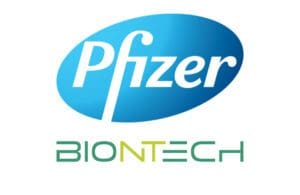 FDA staff released data today confirming the performance of the BNT162b2 COVID-19 vaccine candidate from Pfizer (NYSE:PFE) and BioNTech (NSDQ:BNTX).
FDA staff released data today confirming the performance of the BNT162b2 COVID-19 vaccine candidate from Pfizer (NYSE:PFE) and BioNTech (NSDQ:BNTX).
The vaccine appears to be on track to receive emergency use authorization to inoculate Americans at least 16 years old based on its Phase 3 trial involving roughly 44,000 participants.
The average efficacy rate for the vaccine in the trial was 95%, and the vaccine demonstrated similar efficacy across age groups, genders, ethnic groups and patients with medical comorbidities.
The FDA noted in its remarks that the BNT162b2 vaccine “did not raise specific safety concerns,” although common side effects include injection site reactions, fatigue, headache and muscle pain.
Four clinical trial volunteers developed Bell’s palsy, a form of partial facial paralysis, but the FDA determined that they were likely unrelated to the vaccine. The agency recommended surveillance for cases of Bell’s palsy once the vaccine is available. The agency also highlighted the possibility that a small number of vaccine recipients experienced allergic reactions.
U.K. authorities recently warned people with severe allergies to avoid the vaccine after two people suffered anaphylactoid reactions.
Pfizer and BioNTech filed for emergency use authorization (EUA) for the vaccine on Nov. 20.
The FDA documents stated there was insufficient data to determine whether to recommend the vaccine to pregnant women, immunocompromised people or people under the age of 16.
An advisory committee known as the Vaccines and Related Biological Products Advisory Committee (VRBAC) will meet on Dec. 10 to evaluate the vaccine’s prospects for EUA. The panel will meet again on Dec. 17 to discuss granting emergency use authorization to Moderna’s COVID-19 vaccine candidate.
Filed Under: clinical trials, Drug Discovery, Infectious Disease



